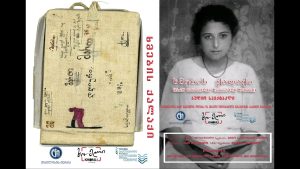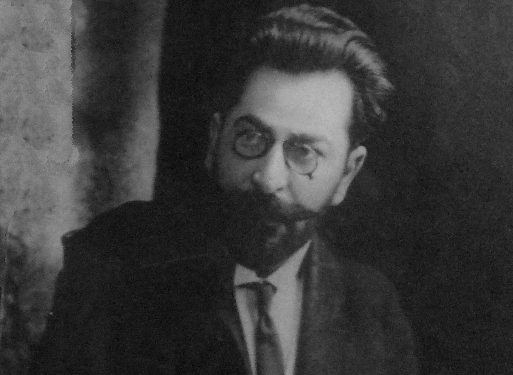The heartbreaking elegy that follows was written by the poet Kote Makashvili after the death of his daughter Maro. When the Red Army invaded, Maro volunteered as a Sister of Mercy with the Red Cross. She was killed by shrapnel near Kojori on February 19, 1921.
As a young man, Kote Makashvili attended university in St. Petersburg, but was expelled for participating in strikes in the 1890s held by a liberal student movement demanding greater academic freedoms and reforms.
After returning to Tbilisi in 1900, Makashvili worked as a teacher and was active in the famous Society for the Spreading of Literacy Among Georgians—a charitable organization that played a critical role in countering Russification by promoting Georgian-language education. Maro, one of two children and his only daughter, was born in 1901.
Makashvili was a few years older than the poets of the popular Futurist and Blue Horn movements, and he had a practical, conservative bent. He stands as a fatherly figure on the edge of a bright and lively independent Georgia. He supported numerous independent publications, was a founding member of several cultural organizations, and managed a café that hosted cultural events.
During Georgia’s first independent elections, Makashvili joined the Union of Independents, a small political party of non-socialists which included the famous Ivane Javakhishvili, a founder of Tbilisi State University. During the Democratic Republic of Georgia, he was also a member of the Constitutional Commission which drafted the country’s first constitution.

His daughter’s diaries speak of him affectionately, and worries to herself about the financial strain her elaborate plans to travel the world might have on him. “Dear Father,” she writes in one letter, “I miss you so much. I study hard and read books diligently. Did you read the story I sent you? I’m also waiting for an answer to my riddle. Let’s see if you can guess what secret purpose was devised! Kisses to you.”
At the end of 1921, on December 17, Kote Makashvili was elected to the chairmanship of the Writers’ Union. He died 6 years later after a long illness.
Translation of For Maro by Kote Makashvili (1876 – 1927):
For Maro
I’m tired now. My dreams sit heavy in the sky.
My pulse no longer quickens at the stars.
A magic circle forms below, I’m spun inside.
Hexed and heart-stricken without you, my Maro.
Life and death, both pale and frozen,
For February has made of May an endless winter.
My chest has splintered beneath a glacier.
The grief of Makashvili leaves Sakartvelo soaking.
Tired, torn, and fallen… I beckon for you.
My daughter, saint and hero, please mend these pieces.
For the motherland? For Maro? For whom to drown?
As either may immerse me any moment.
But no! A momentary lapse of weakness. Forgive me!
Maro’s father? Of such middling mettle? So crackable?
Impossible. You are what pounds my heart flame.
You are unshakable, and I too must be faithful.
So look at me, like an oak tree, firm and calm.
Weathering my post, standing strong in the storm.
Though fate may fell or split me with lightning,
Let me, like you, fall as a knight with honor.
Translated by Ryan Sherman and Maia Tserediani














